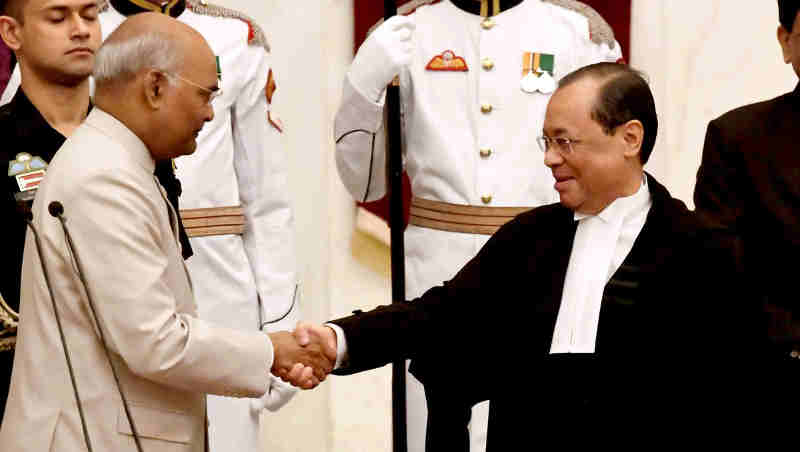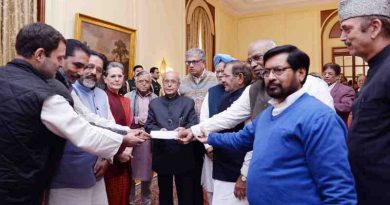Indian Courts Are Not Ready to Work in English Language

Risks of Language Limitations in Indian Judiciary: Pitfalls and Solutions
Indian Courts Are Not Ready to Work in English Language
You can click here to download the pdf version of this consultative paper.
The language used in Indian courts is so bad that it is not possible to make heads or tails of the sentences written in the court documents, including petitions and orders.
By Rakesh Raman
There is no denying that English language has become a veritable raison d’être for people who want to survive and progress in an underdeveloped country such as India. But Indian professionals show scant respect for English. Case in point: Indian legal profession.
The ongoing court case related to the controversial Rafale deal has once again brought home the fact that the Indian courts are not yet ready to work in English language.
Although most judgements – like the Rafale verdict pronounced in December 2018 – of courts are flawed because judges and lawyers lack domain expertise in the cases they handle, the prime reason for the repeated goof-ups is the lack of English language skills among the Indian legal fraternity.
The Indian law colleges and universities are also not fully equipped to teach English to law students. Result: Clumsy court cases.
Cases with English Errors
On December 14, 2018, a three-judge bench of Chief Justice of India (CJI) Ranjan Gogoi and Justices S K Kaul and K M Jospeh had dismissed petitions which demanded a court-monitored probe into the multi-billion dollar deal for the purchase of 36 Rafale jets from France.
However, it was later observed that the court judgement was wrong because the judges could not understand the English language written in the note submitted by the Indian government which is defending the Rafale deal. Subsequently, the government filed a new affidavit in Supreme Court with the plea to make corrections in its order.
But the court order in the Rafale case is not the only bloomer in which English language is being blamed. The flawed use of English is visible in almost all petitions and court orders in India.
In fact, BBC reports that the wrong English is being used at an alarming frequency in the Indian court documents. In its report headlined, “Does this court judgement make any sense?” BBC has given many examples of legal communications which are so complicated that they make little sense.
A Supreme Court bench, for instance, sent back a convoluted judgement from a high court judge in Himachal Pradesh. The top court asked to get the judgement redrafted because it failed to understand it.
|
Language Flaws in Indian Legal Documents |
|
Grammatical Errors Convoluted Sentences Semantic Problems Wrong Connotations Ambiguous Phrases Gender Bias |
The language used in Indian courts is so bad that it is not possible to make heads or tails of the sentences written in the court documents, including petitions and orders.
In its report, BBC has given some extracts that manifest the fact that Indian advocates and judges need full English language training before allowing them to handle court cases.
Here are some examples of bad language.
“However, the learned counsel…cannot derive the fullest succour from the aforesaid acquiescence… given its sinew suffering partial dissipation from an imminent display occurring in the impugned pronouncement hereat wherewithin unravelments are held qua the rendition recorded by the learned Rent Controller…”
Another example:
“The summum bonum of the aforesaid discussion is that all the aforesaid material which existed before the learned Executing Court standing slighted besides their impact standing untenably undermined by him whereupon the ensuing sequel therefrom is of the learned Executing Court while pronouncing its impugned rendition overlooking the relevant and germane evidence besides its not appreciating its worth. Consequently, the order impugned suffers from a gross absurdity and perversity of misappreciation of material on record.”
According to the BBC report, a 268-page Supreme Court judgement from Justice Dipak Misra was particularly verbose in dismissing a challenge to the constitutionality of the criminal offence of defamation. The judge wrote:
“This batch of writ petitions preferred under Article 32 of the Constitution of India exposits cavil in its quintessential conceptuality and percipient discord between venerated and exalted right of freedom of speech and expression of an individual, exploring manifold and multilayered, limitless, unbounded and unfettered spectrums and the controls, restrictions and constrictions, under the assumed power of ‘reasonableness’ ingrained in the statutory provisions relating to criminal law to reviver and uphold one’s reputation”
Flawed Legal Documents
These are not only the court documents that are invariably written in wrong English, but the documents of the Ministry of Law and Justice of the Government of India are usually erroneous.
For example, a notification issued by the Legislative Department of the Ministry about The Prevention of Corruption (Amendment) Act, 2018 is written in such a long-winded style that it is almost impossible to understand its purpose.
‘‘7A. Whoever accepts or obtains or attempts to obtain from another person for himself or for any other person any undue advantage as a motive or reward to induce a public servant, by corrupt or illegal means or by exercise of his personal influence to perform or to cause performance of a public duty improperly or dishonestly or to forbear or to cause to forbear such public duty by such public servant or by another public servant, shall be punishable with imprisonment for a term which shall not be less than three years but which may extend to seven years and shall also be liable to fine.”
Such long sentences which are written without a stop, in fact, challenge the biological limits of a person because it is not possible for a normal human being to retain their convoluted meaning in mind.
This sentence, for example, can be broken into parts to make the whole statute easily comprehensible. But sentence-breaking – which is part of sentence construction in English – is an exclusive skill which is difficult to learn.
Another serious problem in the Indian legal documents is that they always assume that the culprit is a male. In the above notification, for example, you can see the use of himself and his in “…attempts to obtain from another person for himself” and “…illegal means or by exercise of his personal influence”.
This is gender-biased English tilted against the male persons. There are specific rules to write gender-neutral language that most legal professionals do not understand.
Poor Quality Of Education
The trouble begins in the Indian law institutes – colleges and universities – most of which do not have qualified teachers to teach proper English to students.
The focus of these institutes is on imparting traditional law education which is not sufficient to prepare students to survive in today’s communications-driven world.
If you ask the law teachers in India to appear in a properly designed English language test, nine out of every 10 teachers will fail in the test. Then how can they provide holistic education to students to help them work in the cut-throat professional environment? They can’t. Worse, most teachers and legal professionals refuse to learn proper English because they have a false belief that their language is good or language does not matter.
The consequences of this skill gap are disastrous for the Indian legal system. As lawyers cannot write simple, unambiguous applications, they lift text from old cases and use them in their documents without any attempt to correct or customize them. They cannot write bespoke applications and petitions because they find it difficult to rewrite in English.
Therefore, most lawyers are offering template-based services to their clients – most of whom are illiterate or ignorant. When such cases go to the courts, the judges and court staff find it difficult to decipher the complex language written in the petitions.
The courts deliver ad hoc pronouncements without fully understanding the cases because they are filed in English language. The losing parties keep filing appeals or review petitions – which is also a reason for huge pendency in Indian courts. Today, there are nearly 33 million pending cases in different courts of India.
Scarce Solutions
But what are the solutions to overcome the language problem? The solutions are limited because there are hardly any trained teachers who can teach content-grade professional English to law students and the practicing lawyers are not quite eager to learn.
Although the English education must start at the primary level in schools, almost all schools in India are not fully prepared to impart the right language and communications skills to school children.
The education should include reading, writing, speaking, listening, and debating skills in English along with the fundamentals of language. But this education is not part of the school curriculum and teachers themselves do not understand the finer nuances of English which is required in all professional jobs.
After learning wrong English in schools when the students enter colleges and universities, it becomes extremely difficult for them to learn and use professional English because at that time they need to first unlearn and then relearn the language.
|
Solutions to Overcome Language Problems |
|
Dedicated English Academic Centers in Law Colleges and Universities Specialized Content Management Departments in Courts English Training to Judges and Court Staff Creation of Legal Documents Using Artificial Intelligence Preparation of Style Guides to Produce Content-Grade English |
There is an option to use Hindi or other local languages in Indian courts. But in today’s globalized and connected world, the use of English in the legal profession is inevitable because English is the de facto language or the lingua franca of the professional world.
If Indian law colleges and universities want to solve this persisting language problem, they must start special English academic centres in their institutes. The students’ training must be based on professional English rules and language style guides to help them develop their careers.
Tech Support
Although the use of Artificial Intelligence (AI) in the legal ecosystem is in its infancy, soon AI can help Indian courts to deal with language problems.
In order to remove the human subjectivity and incompetence from the judicial systems, computer scientists are increasingly using advanced information technology (IT) tools in the legal profession.
Artificial Intelligence (AI) and its use with Machine Learning (ML) are among the contemporary technologies that have proved their utility in the emerging justice system.
The application of AI has already produced robot lawyers and chatbots that interact with humans to help them present their cases in traditional courts.
But now research shows that digital algorithms are poised to bring more knowledge and transparency to the justice system, as the conventional court judgments given by judges will be supported by the dedicated AI expert systems.
Recently, the European Commission for the Efficiency of Justice (CEPEJ) and the Courts Administration of the Latvia organized a conference on “Artificial Intelligence at the Service of the Judiciary” in Riga (Latvia).
The conference brought together representatives of the academic world, justice professionals, judicial institutions from different European countries to explore how AI can be used to support the work of legal professionals and courts and ensure a better quality of justice. Now, the Council of Europe has adopted the first European Ethical Charter on the use of AI in judicial systems.
While AI has diverse applications in the legal field, the Indian advocates and courts can use AI at least for producing professionally written English documents. The sooner the better.
You can click here to download the pdf version of this consultative paper.
About the Author

The author of this article Rakesh Raman is a national award-winning journalist and social activist. Besides working at senior editorial positions with leading media companies, he was writing an exclusive edit-page column regularly for The Financial Express (a daily business newspaper of The Indian Express Group).
Nowadays, for the past about 8 years, he has been running his own global news services on different subjects. He writes a Legal Directions newsletter that covers Indian and international legal affairs.
He also has formed a free Education and Career Counselling Center for deserving children at a poor J.J. Colony in Dwarka, New Delhi under his NGO – RMN Foundation.
He runs an exclusive community-driven anti-corruption social service “Clean House” to help the suffering residents of Delhi raise their voice against the growing corruption and injustice. He also creates and distributes a number of digital publications that cover areas such as technology, law, environment, education, corruption and transparency.
He has created a comprehensive online information service to educate the Indian voters for the upcoming Lok Sabha election scheduled to happen in 2019.
Earlier, he had been associated with the United Nations (UN) through United Nations Industrial Development Organization (UNIDO) as a digital media expert to help businesses use technology for brand marketing and business development.
Contact
Rakesh Raman
463, DPS Apts., Plot No. 16, Sector 4
Dwarka, Phase I, New Delhi 110 078
INDIA
Contact by email.





